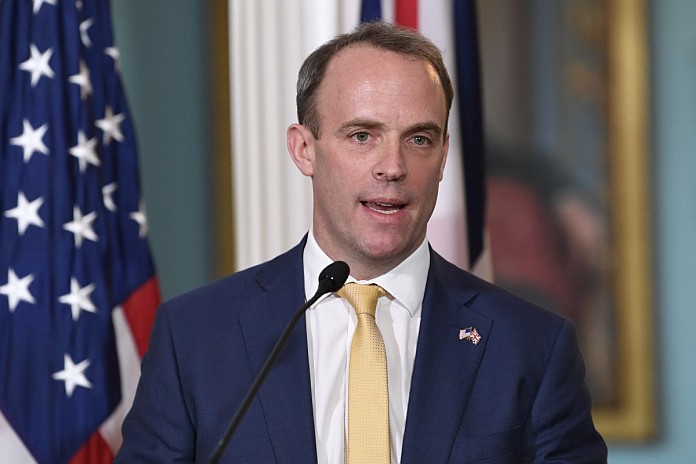By Caribbean News Global ![]()
LONDON, England – UK Foreign Secretary Dominic Raab will rally NATO allies to face down the threat from Russia and ensure it faces real-world consequences for hostile activity, says the Foreign, Commonwealth & Development Office, (FCDO).
In a statement, the FCDO announced that foreign secretary Dominic Raab will rally NATO Allies to face down the threat from Russia and ensure it faces real-world consequences for hostile activity.
Ahead of the meeting, foreign secretary Dominic Raab, said: “This is an important opportunity for NATO allies to gather together and discuss the value of our alliance in a world where democracies are under threat from authoritarian powers and non-state actors who use cyber threats and malicious new technology to sabotage the rules-based order.
“The UK, as a leading defence and diplomatic power, fully backs NATO as a strong military deterrent to the threats from Russia but also as a strong, united, political bulwark against Moscow’s de-stabilising activities.”
Secretary Raab “will deliver the message at a NATO ministerial meeting on Russia taking place today as part of a two-day summit in Brussels – the first in-person meeting of NATO foreign ministers in over a year, and will set out the changing nature of Russian aggression which deploys new and disruptive technology threatening democracies and open societies around the world. This includes Russia’s development of new, cutting-edge missile systems built to evade conventional defences, and state-backed cyber-attacks that target sensitive data, try to interfere in elections or spread disinformation about coronavirus.”
Further, the foreign secretary is expected to reiterate the “UK’s unwavering support for NATO as the bedrock of transatlantic security, and support proposals that will strengthen the Alliance’s political response to a whole range of existing and emerging threats,” besides, “he will also back NATO’s Open Door policy that offers a route to NATO membership, including for countries facing Russian aggression such as Ukraine and Georgia.”
According to FCDO, “this sits alongside the importance of working with non-NATO partners to tackle rising global challenges, including by engaging with European states such as Sweden and Finland, or Indo-Pacific powers like Australia, New Zealand and Japan.”
The meeting follows the publication of the UK’s Integrated Review, which assessed that Russia remains the most acute threat we face, and the Defence Command Paper which set out how the UK will modernise our forces across sea, land, air, space, and cyberspace.
At a separate session on day one of the meeting, Tuesday 23 March, the foreign secretary called for maximum ambition when NATO agrees a bold new agenda on climate security. This will include discussing ways to significantly reduce greenhouse gas emissions from military activities, to improve climate disaster response capability, have better early warning systems and an Alliance-wide assessment of how climate change will impact NATO and critical energy infrastructure.
On Tuesday, the foreign secretary also met with US Secretary of State Antony Blinken, French foreign minister Jean-Yves Le Drian and German foreign minister Heiko Maas – members of the Transatlantic Quad – to discuss our shared priorities and co-ordinate transatlantic approaches key global challenges – including Iran, Russia and Yemen.





